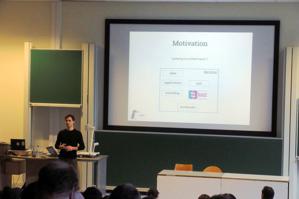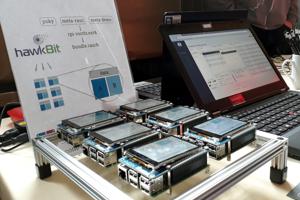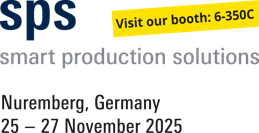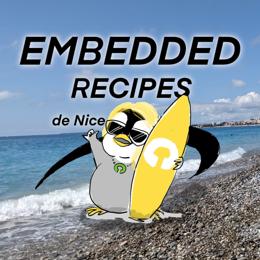Pengutronix at FOSDEM 2018
As in the previous years a bunch of Pengutronix developers attended the FOSDEM Open Source conference in Brussels to stay up-to-date with the latest developments in the context of embedded Linux, graphics and media, electronics and lots of other interesting topics.
With his talk Facing the Challenges of Updating Complex Systems Pengutronix developer Enrico Jörns looked at the updating topic beyond the basic considerations about redundancy, atomicity, simple verification and A/B setups that are luckily solved by most nowadays Open Source updating frameworks such as RAUC.
Instead, he pointed out, designing a robust update system does not mean assembling unrelated building blocks but instead requires fine-tuned configuration of all system components from the bootloader to the deployment software to smoothly interact.
While installing updates itself is solved by standard frameworks by now, handling target selection in the bootloader still requires error-prone custom scripting in many cases. With bootchooser Pengutronix brought a framework for this to the Barebox bootloader, making it an ideal candidate for redundant system designs. Enrico also noted that UEFI provides a similar mechanism with its boot target handling as well.
One of the other noteworthy topics covered in his talk was the possible benefit of using the casync content chunking tool for embedded system updates over limited data connections. With this, it is possible to reuse local data chunks that are identical between the update and the current system and download only those which differ over the network connection. Thus, future versions of RAUC will support casync-based bundles.
Thanks to the folks from OpenEmbedded we were able to bring our over-the-air updating demo to their stand at FOSDEM. This was a great opportunity for us to discuss with hackers from all different fields of interest about reproducible embedded system builds and the closely related importance of safe and secure update strategies in a growing world of embedded and IoT devices.
Beside our popular black pencils also our new Pengutronix penguin stickers and project/job cards that we got ready right in time before FOSDEM enjoyed great popularity.
Thanks to the entire FOSDEM team for organization, support and video recordings!
Further Readings
You can buy RAUC and labgrid sponsor packages now
RAUC and labgrid are open source software projects started at Pengutronix, that are quite successful in their respective niche. Starting today you can buy sponsorship packages for both projects in the Linux Automation GmbH web shop, to support their maintenance and development.RAUC v1.15 Released
It’s been over half a year since the RAUC v1.14 release, and in that time a number of minor and major improvements have piled up. The most notable change in v1.15 is the newly added support for explicit image types, making handling of image filename extensions way more flexible. Other highlights include improved support for A/B/C updates and several smaller quality improvements. This release also includes the final preparations for upcoming features such as multiple signer support and built-in polling.
Pengutronix at SPS in Nuremberg
After some years of absence, Pengutronix is back at the SPS 2025 in Nuremberg. You will find us in hall 6, booth 6-350C. We are looking forward to connecting with old and new friends, partners and customers. As usual, we will be showcasing demonstrators on current topics at our exhibition stand.
GStreamer Conference 2025
This years GStreamer conference was held at the end of Oktober in London, UK. Since GStreamer is our goto-framework for multimedia applications, Michael Olbrich and me were attending this years conference to find out what's new in GStreamer and get in touch with the community.
Talks, Workshops, Time at the Beach - Embedded Recipes 2025
I was part of a small delegation of Pengutronixians at the Embedded Recipes conference this year in Nice, France. We had a great time there, so let's take a look back at the great talks we have seen, the labgrid workshop we held and our time in Nice in general.
RAUC - 10 Years of Updating 🎂
10 years ago, almost a decade before the Cyber-Resilliance-Act (CRA) enforced updates as a strict requirement for most embedded systems, Pengutronix started RAUC as a versatile platform for embedded Linux Over-The-Air (and Not-So-Over-The-Air) updates.
Netdevconf 0x16
After a longer time with online-only events, the Netdev 0x16, a conference about the technical aspects of Linux Networking, was organized as hybrid event: online and on-site at Lisbon.
CLT-2022: Voll verteilt!
Unter dem Motto "Voll verteilt" finden die Chemnitzer Linux Tage auch 2022 im virtuellen Raum statt. Wie auch im letzten Jahr, könnt ihr uns in der bunten Pixelwelt des Workadventures treffen und auf einen Schnack über Linux, Open Source, oder neue Entwicklungen vorbei kommen.
Wir haben doch etwas zu verbergen: Schlüssel mit OP-TEE verschlüsseln
Moderne Linux Systeme müssen häufig zwecks Authentifizierung bei einer Cloud- basierten Infrastruktur oder einer On-Premise Maschine eigene kryptografische Schlüssel speichern. Statt der Verwendung eines Trusted Platform Modules (TPM), bieten moderne ARM Prozessoren die TrustZone-Technologie an, auf deren Basis ebenfalls Schlüssel oder andere Geheimnisse gespeichert werden können. Dieses Paper zeigt die Nutzung des Open Portable Trusted Execution Environments (OP- TEE) mit der Standardkonformen PKCS#11 Schnittstellen und i.MX6 Prozessoren von NXP als Beispiel.














